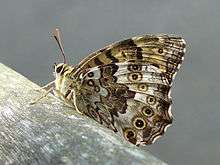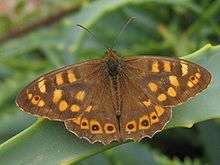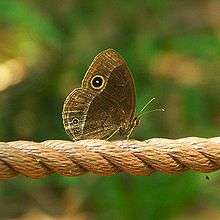Elymniini
The Elymniini, or true browns, are one of the large tribes of the browns subfamily (Satyrinae) in the brush-footed butterfly family (Nymphalidae). Sometimes, they are elevated to subfamily status as Elymniinae.[1]
| True browns | |
|---|---|
.jpg) | |
| Peal's palmfly (Elymnias pealii, Elymniina) | |
| Scientific classification | |
| Kingdom: | |
| Phylum: | |
| Class: | |
| Order: | |
| (unranked): | |
| Superfamily: | |
| Family: | |
| Subfamily: | |
| Tribe: | Elymniini |
| Subtribes | |
| Synonyms | |
| |
Systematics
They are commonly subdivided into four subtribes (tribes when considered a subfamily). The largest tribe is called Lethina, with Parargina usually treated as a junior synonym. But this is not correct as it seems: according to cladistic analysis of mtDNA COI and NADH dehydrogenase subunit 1 sequence data, the Parargina – i.e. the group around Pararge, including at least the very similar Lasiommata as well as Tatinga and it is the doubtfully distinct relative Chonala – form a distinct lineage after all, immediately basal to the distinctly apomorphic Mycalesina and the more plesiomorphic Lethina proper; the accurate circumscription of these subtribes remains yet undetermined. In any case, these three constitute the bulk of the tribe's diversity. The Elymniina and Zetherina, by contrast, quite certainly form a less diverse clade that diverged early on in the evolution of the tribe.[2]
Selected genera
Subtribes are listed in the presumed phylogenetic sequence, from the most ancient to the most advanced; genera are listed alphabetically. Some species are also listed.[3]
Subtribe Elymniina
- Elymnias Hübner, 1818 – palmflies
- Elymniopsis Fruhstorfer, 1907
- Hyantis Hewitson, 1862
- Morphopsis Oberthür, 1880
Subtribe Zetherina
- Callarge Leech, 1892
- Ethope Moore, 1866 (sometimes placed in Lethina)
- Ethope himachala – dusky diadem
- Neorina Westwood, 1850 (sometimes erroneously placed in Lethina)
- Neorina patria – white owl
- Penthema Doubleday, 1848
- Zethera Felder, 1861


Subtribe Lethina (including Parargina, but paraphyletic)
- Chonala Moore, 1893 (might belong in Tatinga)
- Enodia Hübner, [1819] – pearly-eyes
- Hanipha Moore, 1880
- Kirinia Moore, 1893 (including Esperarge)
- Lasiommata Westwood, 1841 – walls and wallbrowns (formerly in Pararge)
- Lethe – treebrowns, woodbrowns, foresters and relatives
- Lopinga Moore, 1893 (formerly in Pararge)
- Mandarinia Leech, 1892
- Neope Moore, 1866
- Ninguta Moore, 1892
- Nosea Koiwaya, 1993
- Orinoma Gray, 1846
- Pararge Hübner, 1819
- Ptychandra C. & R. Felder, 1861
- Rhaphicera Butler, 1867
- Satyrodes Scudder, 1875
- Tatinga Moore, 1893 (might include Chonala)

Subtribe Mycalesina
- Bicyclus Kirby, 1871
- Bletogona C. & R. Felder, 1867
- Hallelesis Condamin, 1961
- Heteropsis Westwood, 1850 (including Admiratio, Henotesia, Houlbertia, Masoura)
- Mycalesis – bushbrowns
- Nirvanopsis
- Orsotriaena – smooth-eyed bush-brown
- Pseudomycalesis Tsukada & Nishiyama, 1979
Fossil record
Several prehistoric genera have been described from fossils:
- Neorinella Martins Neto et al., 1993
- Neorinopsis
- Pseudoneorina Nel & Descimon, 1986
- Satyrites Scudder, 1872
They are usually all assumed to belong to the Lethina; due to the non-monophyly of that group, all that can be said is that they are probably fairly basal members of the more diverse radiation. Fossils from near the time of such divergences often yield interesting insight into the patterns of evolution.
Footnotes
- E.g. Yin et al. (2007) and sources cited in Savela (2008)
- Yin et al. (2007)
- For references, see Savela (2008)
References
| Wikimedia Commons has media related to Elymniini. |
- Savela, Markku (2008): Markku Savela's Lepidoptera and Some Other Life Forms: Satyrinae. Version of 3 September 2008. Retrieved 18 March 2009.
- Yin, Xian-bing; Hao, Jia-sheng; Xu, Li; Zhu, Guo-ping; Huang, Dun-yuan & Pan, Hong-chun (2007): 基于线粒体 ND1 和 COI 基因序列探讨锯眼蝶 亚科主要类群的系统发生关系 ["Phylogentic[sic] Relationships of Butterflies in the Subfamily Elymninae [sic] (Lepidoptera: Satyridae) Based on Mitochondrial ND1 and COI Gene Sequences"]. Zoological Research 28(5): 477-484 [Chinese with English abstract]. PDF fulltext